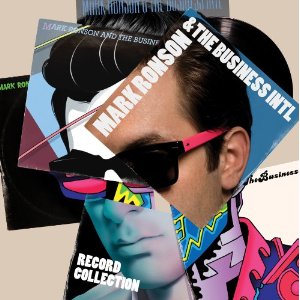Reviews
ALBUM REVIEW: Mark Ronson & The Business International – Record Collection

Mark Ronson has crafted an entire career around the concept of being a soulful outlier in the world of mainstream pop. Kicking off his career as a major label album releasing DJ, musician and producer with 2003's debut Here Comes the Fuzz and notable lead single "Oooh Weee." Ronson's ability to blend soulful leanings with an attraction to off kilter collaborative combinations makes him to soul what Diplo has become to hip hop. The one person in the room who is an expert at coaxing what is rapidly becoming an expected excellence out of the most unexpected of places. Now, onto his third and most focused release, Mark Ronson and the Business International's Record Collection, he appears to have reached a level of supreme comfort in his unusual craftsmanship, and delivers an album that confirms his genius as a master producer.
[youtube TM6TCGltfHM nolink]
Mark Ronson joins a very small handful of independent and underground producers as being the most important progressive creative forces of the last decade. Listen to the brilliant Britney Spears by way of Screamin' Jay Hawkins reintrepretation of "Toxic," Lily Allen's take on the Kaiser Chiefs' "Oh My God," Daniel Merriweather's slaying of The Smiths' "Stop Me" and the legend of arguably Amy Winehouse's finest vocal performance ever, her cover of The Zutons' "Valerie" from 2007's Versions as proof that he had arrived, and Record Collection as proof he has the skills to stay around. Ronson makes things simple. A concept needs a sound. Ronson seeks out the perfect auteurs for the sound, lays the track, and the performers don't exceed their capabilities, rather they meet them, and the track does the rest of the work, carrying the combination to a place of legend. Q-Tip and MNDR's Amanda Warner on the lead single could only happen on a Mark Ronson album with such tremendous results like lead single with Francophonic hook of the year "Bang Bang Bang." Ronson plugs into the ultra reclusive cool of grandfather of blipster culture Spank Rock and in aligning him with Scottish crooner Kyle Falconer, current single "The Bike Song" is excellent in its quirky hipster friendly indie pop realm.
[youtube rVELTxKRoHA]
The true sonic grace and recorded monstrosities on this album come when Ronson finally extends himself into unfamiliar territory, in working with legends instead of talented unknowns and almost theres. English pop singers seem to have universally grown up as fans of American soul. Simon LeBon of Duran Duran proved this on the duo's big 1993 return The Wedding Album with "Ordinary World" and "Come Undone." Boy George infused Culture Club's 1983 smash Colour by Numbers with poppier yet soulful intonations, and eponymous soundtrack hit as a solo artist from the film The Crying Game is a now underrated, yet Grammy award winning pop ballad that is often forgotten. Both of these men find their way onto this album, and both slay their tracks, as Boy George, in collaborating with Miike Snow's Andrew Wyatt breathes a timeless effervescence into lovelorn yearner "Somebody to Love Me." Two step and funky emcee Wiley joins forces with LeBon for the unexpectedly solid eponyomous album title single, proving that Ronson continues to improve.
However, his work with younger emcees like Atlanta's Pill, oft collaborator Ghostface Killah and a most notably a hook from "back from the back of the milk carton" file soul urban legend D'Angelo on "Glass Mountain Trust" underwhelm as Ronson attempts to stay true to his hip hop roots, but on an album steeped in new school craftsmanship derived from dusty soul records, they are excellent as expected, but short of a standard that for the average producer is excellent, but for the excellent producer is only mediocre. His work with understated Morrissey devotee Theophilus London and ex-Pipette Rose Elinor Dougall on "Hey Boy" for the mood of this release outside of the mainstream trending lead singles.
In final, Mark Ronson's Record Collection shows a producer at the height of his craft. As he grows in comfort with his status as a future legend, the results will only improve. The hardest thing about crafting a road less traveled, is developing the skill to smooth the path. Ronson's development is notable, and this album succeeds because of it.